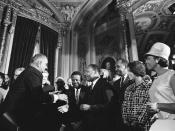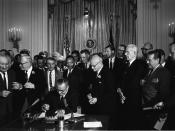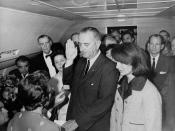President KennedyÃÂs ÃÂNew FrontierÃÂ and President JohnsonÃÂs ÃÂGreat SocietyÃÂ both proposed major changes to the USA under economic, social and civil rights issues. However, because some of the changes were so radical, the programs faced considerable opposition from a variety of groups and this had an effect on their success. Kennedy and Johnson both faced individual opposition to their policies. However Kennedy arguably got the worst of it because a) he was the first one to introduce these policies, and b) he could not deal with the opposition he received as well as Johnson could.
Kennedy received opposition from three main groups: Protestant Christians, older members of Congress and Southern Democrats. Each of these groups had a problem with the way Kennedy was going about his job. The Protestants were suspicious of Kennedy because he was Catholic, and the majority of presidents before him were Protestant. Older members of Congress felt Kennedy was too young and inexperienced to handle the job he had been given; this distrust was amplified by the fact that Kennedy never made much of an effort to persuade members of Congress to support his policies.
But Kennedy received the most opposition from Southern Democrats, who were opposed to black Civil Rights. Kennedy hoped to be re-elected in 1964 and needed the support of these Congressman, and as a result did not play a leading role in the Civil Rights Movement for fear of losing their support.
With KennedyÃÂs assassination in 1963, Vice-President Johnson became President. As a foremost supporter of Kennedy he was faced with the task of continuing on KennedyÃÂs policies alongside introducing his own. However the opposition he faced was not as much a problem for him as it was for Kennedy, because Johnson was a) a dominating figure, b) an experienced politician, and...


